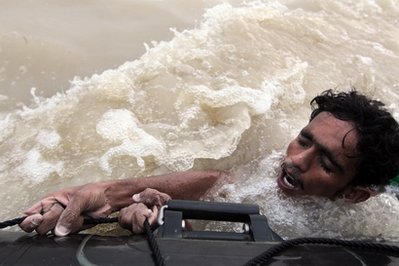Asia-Pacific
UN warns of second wave of Pakistani flood deaths
(Agencies)
Updated: 2010-08-12 10:42
 |
Large Medium Small |
SUKKUR, Pakistan - The United Nations appealed on Wednesday for $459 million in aid for flood-hit Pakistan, warning of a second wave of death among sick, hungry survivors unless help arrived quickly.
 Pakistani flood victim Mohammed Nawaz hangs onto a moving raft as he is rescued by the Pakistan Navy August 10, 2010 in Sukkur, Pakistan. [Agencies] |
Roiling floods triggered by unusually heavy monsoon rain have scoured Pakistan's Indus river basin, killing more than 1,600 people, forcing 2 million from their homes and disrupting the lives of about 14 million people, or 8 percent of the population.
The floods, the worst in the region in 80 years, have raised fears for the prospects of the nuclear-armed US ally already battling a deadly Islamist militancy.
US Defense Secretary Robert Gates said on Wednesday the US military was tripling the number of helicopters in Pakistan to 19 from six and sending in a landing platform to be used off the coast of Karachi, Pakistan's biggest city.
Washington, which had already committed $55 million to Pakistani flood relief efforts, also announced it was contributing a further $16.2 million to the UN refugee agency and International Red Cross for emergency assistance to flood victims.
Aid agencies have complained of a lackluster donor response to the crisis, while a UN spokesman said help was needed soon.
"If we do not respond soon enough to the urgent needs of the population, if we do not provide life-saving assistance as soon as is necessary, there may be a second wave of death caused by diseases and food shortages," said UN humanitarian operations the spokesman Maurizio Giuliano.
Hundreds of roads and bridges have been destroyed from northern mountains to the plains of the southern province of Sindh, where the waters have not yet crested, meaning the situation could get worse.
Countless villages and farms have been inundated, crops destroyed and livestock lost. In some places, families are huddled on tiny patches of water-logged land with their animals surrounded by an inland sea.
On the outskirts of the city of Sukkur, in Sindh, hundreds of people waited for food supplies at a tent camp.
"I can't find my 12-year-old son. I've been to my village with soldiers on a boat but there was no sign of him," said farmer Mohammad Hassan.
"I'm so worried. I don't know what to do. Should I take care of my family here or go and look for my son?" Hassan, a father of 10, told Reuters before rushing into a throng jostling around a truck that arrived with rations of cooked rice.
ECONOMIC DAMAGE
The International Monetary Fund has warned of major economic harm and the Finance Ministry said the country would miss this year's 4.5 percent gross domestic product growth target, although it was not clear by how much.
Pakistani stocks ended 0.17 percent down at 9,875.68 as the economic costs of the disaster rattled investors. the market has lost 5.37 percent since the floods began.
The United Nations says the disaster is the biggest the country has faced and it would cost billions of dollars to rehabilitate the victims and rebuild ruined infrastructure.
Giuliano said he was optimistic aid would arrive and $150 million had already been pledged. The UN World Food Program needs $150 million to feed 6 million people for three months.
Zardari defended his decision to travel to France and Britain at the end of last month.
"Some have criticized my decision, saying it represented aloofness, but I felt that I had to choose substance over symbolism," he said in an opinion piece for The Wall Street Journal.
The British government had pledged $24 million in aid, following his meeting with Prime Minister David Cameron, the Pakistani leader said.
Pakistan's military, which has ruled the country for more than half of its 63-year history, has taken the lead in relief efforts, reinforcing the faith many Pakistanis have in their armed forces and highlighting the comparative ineffectiveness of civilian governments.
Analysts say the armed forces would not try to take power as they have vowed to shun politics and are busy fighting militants.
US military helicopters have been airlifting survivors in an effort that may win Washington some supporters in Pakistan, where anti-American sentiment runs high.
"Let's not talk about politics. We were trapped here and they came to evacuate us," said Abdul Rehman, 37, rescued by a US helicopter after being stranded with a new-born baby and wife.
"They're doing good. Let's appreciate them."
The United States needs a stable Pakistan to help it end a nine-year war by the Taliban in Afghanistan.



